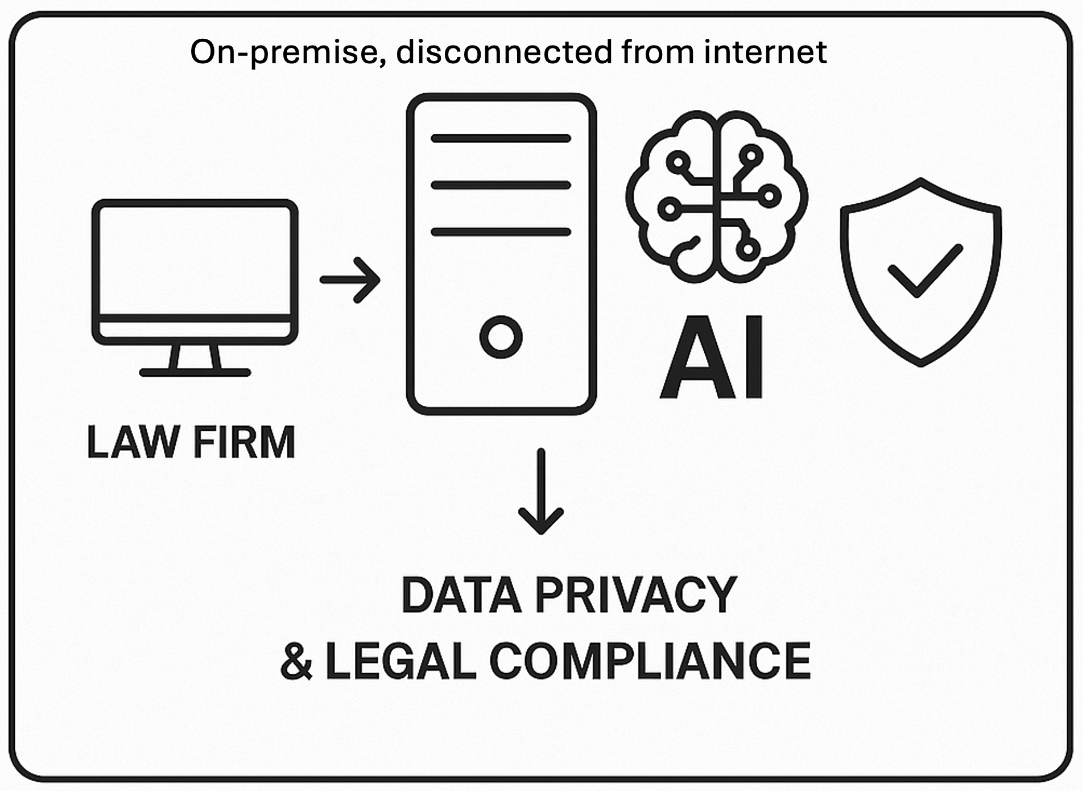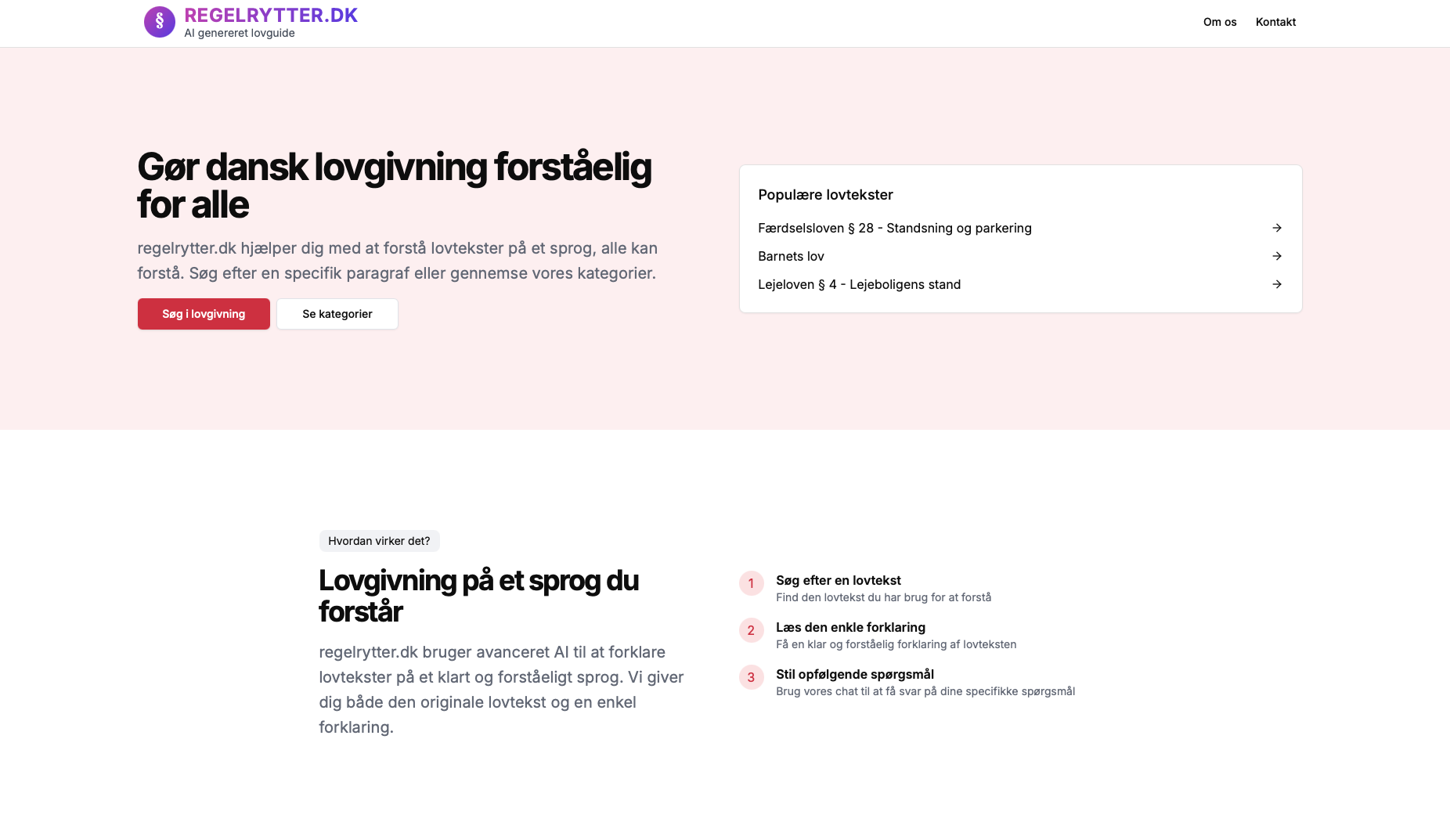Legal firms increasingly need AI assistance for document analysis, case research, and client communication, but traditional cloud-based solutions pose significant compliance and confidentiality risks. A fully on-premise AI assistant offers the perfect solution - complete data control, zero external exposure, and robust legal compliance.

On-premise AI architecture ensuring complete data privacy and legal compliance for law firms.
Unlike cloud-based AI services that send your data to external servers, a private AI assistant runs entirely within your office infrastructure. This means sensitive client information, case files, and internal communications never leave your premises. The system can be completely disconnected from the internet during operation, providing an additional security layer that many legal practices require.
Key Advantages:
- Complete data control within your office infrastructure
- Zero external exposure to cloud AI providers
- Internet-disconnected operation capability
- Full legal compliance and audit trails
- No dependency on external AI service availability
Core components of on-premise legal AI assistant architecture
| Entity | Vendor Name | Description | Key Attributes | Relationships |
|---|---|---|---|---|
Language Model | LLaMA 3 70B + vLLM | Open-source language model quantized and accelerated for efficient local inference | 70B parameters quantized deployment vLLM acceleration | processes legal queries analyzes documents generates responses |
Vector Database | ChromaDB | Document embedding and retrieval system for case files, contracts, and legal precedents | semantic search document embeddings legal precedent storage | stores legal documents enables semantic search supports RAG pipeline |
RAG Pipeline | LlamaIndex | Retrieval-Augmented Generation system for real-time legal document Q&A | document retrieval context generation legal-specific responses | connects to ChromaDB enhances LLM responses maintains legal context |
Automation Engine | n8n Workflow | Orchestrates document uploads, notifications, and workflow automation | workflow automation document processing notification systems | manages document flow triggers processes handles integrations |
User Interface | Streamlit Web App | Clean, intuitive chat interface for legal staff interaction with AI assistant | chat interface document upload response formatting | presents to users collects inputs displays AI responses |
Related AI Innovation Projects
This private legal AI approach builds on similar innovations like Regelrytter.dk's AI legal guidance system and our Company-wide AI framework, demonstrating practical AI implementation across different domains.
Explore AI ProjectsThe foundation of this approach relies on open-source large language models like LLaMA 3 70B, which can be quantized and accelerated using vLLM for efficient inference on local hardware. Rather than requiring massive data center infrastructure, these models can run effectively on high-end gaming PCs or Mac Mini clusters equipped with powerful GPUs.
Recommended Hardware Configurations
Small Firm Setup: Single high-end workstation with RTX 4090 or dual RTX 4080 GPUs, 64GB RAM, and fast NVMe storage for efficient document processing and model inference.
Medium Firm Setup: Mac Mini clusters with M2 Ultra chips or dedicated GPU servers with dual A100s, providing enhanced performance for multiple concurrent users and larger document repositories.
Large Firm Setup: Enterprise-grade GPU clusters with multiple A100 or H100 cards, distributed across redundant servers for high availability and maximum performance.
Scalability Benefits
The beauty of this approach lies in its scalability and hardware flexibility. Firms can start with a single high-end workstation and expand to distributed clusters as their needs grow. The system scales based on specific requirements and budget constraints, making enterprise-grade AI accessible to firms of all sizes.
Enterprise-Grade Security
The system implements comprehensive security measures including JWT authentication, IP access controls, and detailed audit logging. Every interaction, query, and document access is logged for compliance purposes, creating a complete audit trail that many legal practices require.
Data Control and Privacy
This setup ensures compliance with strict legal data policies while providing zero exposure to external AI providers like OpenAI or Anthropic. Your firm maintains complete control over data processing, storage, and access, meeting the highest standards of client confidentiality.
Regulatory Compliance
The architecture supports compliance with various legal industry regulations including attorney-client privilege requirements, bar association guidelines, and international data protection laws. All processing occurs within your controlled environment.
Audit Trail Capabilities
Comprehensive logging systems track all AI interactions, document access, and user activities. This creates a detailed audit trail for regulatory compliance, internal reviews, and quality assurance processes.
Air-Gapped Operation
The system can operate completely disconnected from the internet, providing maximum security for highly sensitive cases or when handling classified legal matters. This air-gapped capability ensures zero external data exposure.
This private legal AI approach builds directly on successful AI implementations demonstrated across various domains, showing how AI can transform complex information into accessible, accurate content.
Core applications and capabilities of on-premise legal AI assistants
| Common Name | Vendor Name | Description | Operators | Examples |
|---|---|---|---|---|
Document Analysis | Legal Document Intelligence | Upload contracts, filings, and case documents for instant AI analysis and summarization | Analyze Summarize Extract Compare Validate | Contract review Filing analysis Document summarization Key clause extraction |
Case Research | Legal Knowledge Engine | Query firm's historical cases and legal precedents using natural language | Search Compare Reference Analyze Connect | Precedent research Case law analysis Historical case review Legal argument support |
Knowledge Management | Internal Expertise System | Create searchable repository of firm's expertise, processes, and institutional knowledge | Store Retrieve Organize Share Update | Process documentation Expertise capture Best practices Institutional memory |
Client Communication | Communication Assistant | Generate draft responses and summaries while maintaining complete confidentiality | Draft Review Personalize Format Optimize | Email drafts Client summaries Status updates Communication templates |
Compliance Monitoring | Legal Compliance Engine | Ensure all AI interactions remain within controlled environment with full audit trails | Monitor Track Report Audit Verify | Interaction logging Access monitoring Compliance reporting Security verification |
"This private deployment model represents the future of AI in legal practice - combining the power of modern language models with the security and compliance requirements that legal professionals demand. By keeping everything on-premise, firms can harness AI capabilities while maintaining strict confidentiality."
Phased Deployment Approach
Legal firms should implement private AI assistants through a carefully planned phased approach. Start with document analysis capabilities using existing case files, then expand to case research functionality, and finally integrate advanced features like automated communication drafting.
IT Team Integration
The entire solution can be deployed, operated, and optimized by your internal IT team or through specialized legal technology consultants who understand both technical requirements and legal compliance landscapes. This ensures seamless integration with existing firm infrastructure.
Staff Training and Adoption
Successful deployment requires comprehensive staff training on AI capabilities, security protocols, and best practices for legal AI interaction. This includes understanding when to use AI assistance and when human expertise is required.
Integration with Existing Systems
The private AI assistant integrates with existing legal practice management systems, document management platforms, and communication tools. This creates a seamless workflow that enhances rather than disrupts current operations.
Continuous Improvement
On-premise deployment allows for continuous model fine-tuning using your firm's specific legal expertise and case history. This creates increasingly valuable AI assistance tailored to your practice areas and client needs.
"Rather than compromising on privacy for convenience, this approach delivers both security and functionality, creating a truly private AI assistant that serves as your firm's own GPT-4 tier legal analyst while maintaining the strict confidentiality that clients expect."
Advanced Legal Reasoning
Future iterations will incorporate more sophisticated legal reasoning capabilities, including multi-jurisdictional analysis, regulatory change tracking, and predictive case outcome modeling - all while maintaining complete privacy and on-premise operation.
Specialized Practice Area Models
Legal AI assistants will evolve to include specialized models for different practice areas - corporate law, litigation, intellectual property, and family law - each fine-tuned with domain-specific expertise while preserving client confidentiality.
Collaborative Legal Intelligence
Private AI systems will enable secure collaboration between law firms through federated learning approaches, allowing firms to benefit from collective legal intelligence without sharing sensitive client data.
Real-Time Legal Updates
Advanced systems will incorporate real-time legal updates and regulatory changes, ensuring AI recommendations remain current with evolving legal landscapes while maintaining offline operation capabilities.
Client Self-Service Portals
Private legal AI will power secure client portals where clients can get immediate responses to common legal questions, draft review, and case status updates - all processed within the firm's secure environment.
Integration with Digital Product Passports
Legal AI systems will eventually integrate with blockchain-based verification systems for document authenticity and legal compliance tracking, supporting emerging regulatory frameworks for digital product traceability.
Sivert Kjøller Bertelsen
AI Innovation Expert & Legal Technology Analyst • AI system architecture and legal technology implementation
"Private legal AI assistants represent the perfect balance between technological advancement and professional responsibility. By keeping everything on-premise, legal firms can harness the full power of modern AI while maintaining the strict confidentiality and compliance requirements that the legal profession demands. This approach doesn't compromise privacy for convenience - it delivers both security and functionality, creating truly private AI that serves as your firm's own GPT-4 tier legal analyst."



